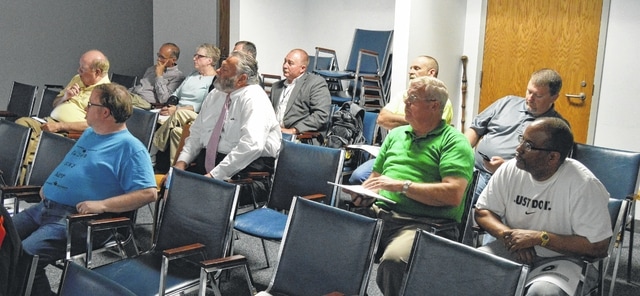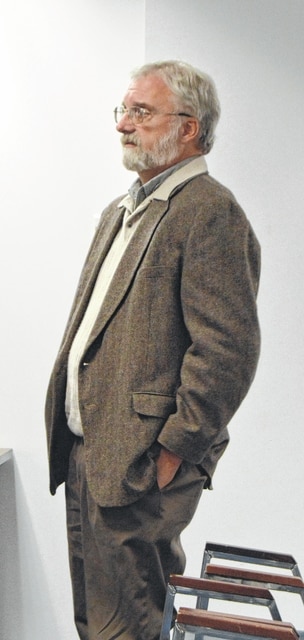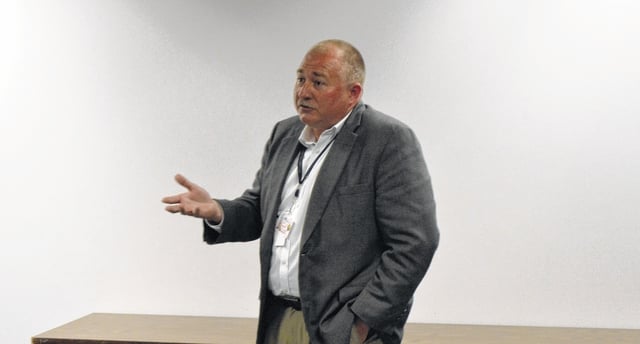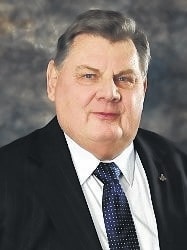



WILMINGTON — While Wilmington council continues to debate asking voters to approve a tax increase, Mayor John Stanforth has announced a partial spending, wage and travel freeze to pressure council into making some determination.
Council discussed the city’s budget — which has a projected $1.3 million deficit and a carryover too small to pass a similar budget next year — at a special workshop meeting of council Thursday. Several council members and non-voting President of Council Randy Riley spoke in favor of a 0.5 percent earnings tax, with some adding it should expire in five years. That tax would generate about $2 million, covering the deficit and providing additional funds.
Finance committee chair Mark McKay ended the meeting by saying that his committee would continue the discussion at its Wednesday meeting. On Friday, Stanforth announced freezes, citing council’s actions.
“Council has dilly-dallied around on this budget issue for so long that I feel as mayor, I’ve just got to do something,” Stanforth said. “I’m going to put a travel freeze on, except for what is essential for required training. I’m going to put a hiring freeze on. I’m going to freeze wages where they are right now. And I’m not going to allow any expenditure over $2,500 without approval of the mayor’s office.”
As for the possibility of a tax increase, officials have been discussing a 0.5 percent earnings tax, in addition to the city’s 1 percent earnings tax, as a way of balancing the budget and creating revenue for other projects, like streets or rebuilding depleted cash reserves.
Riley said a 1.5 percent earnings tax is below the regional and state average. Yearly, that would take an additional $125 from a person earning $25,000 and $250 from someone earning $50,000, Riley said. The minimum wage earner would have $78 in additional taxes.
Riley said many city workers don’t live within city limits but use roads and other city services.
Stanforth said pensioners and retirees also use city services and roads but don’t pay anything.
“You took $78 out of that minimum wage employee’s pocket at the end of the year,” Stanforth said. “That’s probably equal to their utility bill. … It should be an income tax.”
Former council member David Hockaday and Wilmington Tax Commissioner Marque Jones said an income tax doesn’t apply to non-resident workers.
Mark McKay said, “Without additional revenue, we’re not going to be able to pass a budget for 2017 that keeps our general fund services at the level our citizens expect and deserve.”
Mark McKay said it was “appropriate” that citizens should determine if the city collects additional taxes. He also argued that tax should expire in five years.
Council member Randi Milburn said she worries an earnings tax wouldn’t be trusted by voters.
“It’s nice not having earmarked for us, because we can do those other things, like pave the streets and things like that,” Milburn said. “The public doesn’t trust or like politicians. … They’re trusting a politician to do what’s right with the money rather than saying ‘Hey, I know this is earmarked.’”
By contrast, a property tax levy could be earmarked for certain services, such as the police department.
Milburn also argued against a five-year tax, saying it’s rare because once cities have the money from it, they want it to go longer.
Riley said if it were set to expire, council and voters in five years would have to vote to approve it.
“You have to let the voters trust us,” said council member Matt Purkey, agreeing with Riley.
Council member Joe Spicer spoke in favor of a five-year tax but also in favor of looking for budget cuts.
“I’m anti-tax period, but the bottom line is I’m realist,” Spicer said. “We’ve got to do something. For me, the only thing that’s feasible is the earnings tax” for a five-year period.
Spicer said within five years, council may be able to tell if the tax base is strong enough to let the tax expire.
“We’re still spending more than we’re bringing in,” Spicer said. “If we’re going to ask people for money, we still need to find some cuts and trim that down.”
Council member Lonnie Stuckert agreed with Spicer.
“If we’re talking about going to the people, the voters, it’s not a guarantee, yea or nay,” Stuckert said. “Shouldn’t there be some kind of contingency plan?”
Stuckert and Milburn said they’ve heard residents say they will not vote for a tax increase. Milburn said the city’s poorer residents have said they can’t afford the tax increase.
“For lack of a better word, we’re screwed,” Milburn said.
Council members Kelsey Swindler, Jonathan McKay and Mark McKay argued against that mentality.
Jonathan McKay said the city needs to have money for roads, and he argued for a five-year tax, saying that the elected city officials may be completely different within five years.
Swindler said losing the city services that would have to be cut is “non-negotiable.”
“If we go out and tell community members, as some did, that we can maintain city services and not raise taxes, then they start to believe that,” Swindler said. “When you have honest conversations with people and tell them what the nature of the city finances are, the community members in this city are so reasonable and so understanding.”
“I’ve had honest conversations with people,” Stuckert said. “We’re talking about people who have had dips in their yearly income” and will vote against losing more of that income.
Mark McKay said the average pay reduction for someone making $50,000 a year would be $4.87 a week.
“That’s what we have to explain to people,” he said.
Spicer said he would not support any kind of negative, threatening campaign.
“We always threaten people,” Spicer said. “People need to understand … we have to do something” and explain what would happen in a non-threatening way.
“Be open and honest with them,” Spicer said. “But don’t hold a threat over people.”
During the public comments, residents and a business owner reinforced and challenged council member’s perspectives.
Wilmington resident Bill Limbacher told council that he, as a low-income resident, supports an earnings tax increase.
“I am perfectly willing to pay more earnings tax to support the services I use in the city,” Limbacher said.
Hockaday, who served on council for 29 years and recently ended his tenure with the Clinton County Port Authority, said he doesn’t believe the city is going to get $130 or $200 million in payroll within the next five years.
“This thing has been kicked down the road time after time after time,” Hockaday said. “You all have to be together. You’ll have to decide this is necessary. I’ve also found in my 29 years that if you explain why you had to do something to the citizens of this community, it has never been defeated.”
Wilmington resident and landlord Vince Holmes questioned the city’s intent.
“My concern with any sort of rate increase … is that there’ll be monies coming in and it won’t all be dedicated to the P.D. or the F.D. or the asphalt,” Holmes said. “My concern is that you all are going to hire some new people. Or you’re going to give people raises.
“Yeah, there’ll be some asphalt laid, but you’ve got other plans,” Holmes continued.
Wilmington business owner John Schum said Holmes’ comments indicate an information and perception gap that carries over to much of the public.
“They need to know they can get to work without losing a wheel off their car,” Schum said. “They need to know that what they come to rely upon – all the many thousands of things that nobody sees or takes for granted every day is going to continue to happen. … People need to know that we’re doing the right thing.”
Wilmington resident Tyler Williams said he’d like to see spending plans based on if the tax fails and if it passes.
“I think that would give people a really good idea … what type of community can they expect to be living in in the next few years,” he said.
He also called on those who ran on platforms of not increasing taxes to rethink those taxes.
Milburn, who used such rhetoric while running her campaign, said no one is in favor of taxes.
“I’ve not exhausted all options yet,” she said.
Wilmington Police Chief Duane Weyand said the city should consider a permanent 0.5 percent earnings tax with the intent of growing the city, its infrastructure and its quality of life.
“At the end of the day, this whole operation here is a business,” he said, of the city. “We sell customer service.”
Weyand said there are blighted homes that need torn down, trees that need to be planted, trails that need to be built and parks that need funding. Weyand also asked how the city would be able to react to state-level cuts to the local services.
“Those are the investments that we’ve got to make in the community,” Weyand said.
“Hopefully you’ll all be here,” Weyand also said. “This is your legacy. This is my legacy. We’ll all be in the process of making this place a better place to live, work and raise your kids and create a sense of community. It’s time. It’s past time.”
Reach Nathan Kraatz at 937-382-2574, ext. 2510 or on Twitter @NathanKraatz.








